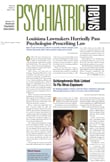Back in 1953, there was a musical called “Call Me Madam.” One of the songs from the musical went like this: “I hear music and there’s no one there, I smell blossoms and the trees are bare. . . .”
These acoustical and olfactory experiences were supposed to be fantasies provoked by falling in love, but musical hallucinations really do exist. They have been noted in persons with hearing loss, in some elderly people, and in some individuals with abnormalities in the temporal lobe (auditory cortex) of the brain. And they are probably also more common among psychiatric patients than previously thought, suggests a new Israeli study published in the February Journal of Clinical Psychiatry.
A decade ago, Haggai Hermesh, M.D., a senior lecturer in psychiatry at Tel Aviv University, and his coworkers conducted a preliminary survey that led them to suspect that psychiatric patients sometimes experience musical hallucinations. They decided to undertake a study to further explore this possibility. Their subjects were 190 consecutive adult outpatients at an urban mental health center in Israel. The outpatients had bipolar disorder, major depressive disorder, obsessive-compulsive disorder, panic disorder, schizophrenia, schizoaffective disorder, or social phobia. None of the subjects had significant hearing loss or known brain damage.
The researchers interviewed the subjects with a short structured interview they had designed called the Geha Short Interview for Musical Hallucinations (GSIMH). The GSIMH examines lifetime occurrence of musical hallucinations, with an emphasis on a false perception of music rather than merely thinking about music, humming to onself, or recollecting music. The researchers found that 51 of the 190 subjects (27 percent) experienced musical hallucinations.
The investigators then looked to see what distinguished subjects who had experienced musical hallucinations from those who had not.
One distinguishing factor was the age of onset of symptoms. The age of onset was four years earlier in subjects reporting musical hallucinations. However, the duration of mental disorders, as well as the level of general education and musical education, were similar between the two groups.
The researchers then assessed whether musical hallucinations were more prevalent in subjects with certain kinds of mental disorders. What they found was that only 26 percent of subjects with schizophrenia had ever experienced musical hallucinations, compared with 41 percent of subjects with obsessive-compulsive disorder (OCD). In fact, OCD subjects were found to have experienced musical hallucinations to a much greater degree than had all of the other diagnostic groups combined.
The investigators then explored the relationship between musical hallucinations and OCD. They looked at the prevalence of musical hallucinations in subjects without OCD, with a sole diagnosis of OCD, and with OCD plus one additional psychiatric diagnosis.
They found that there was an increase in the prevalence of musical hallucinations from a rate of about 20 percent in subjects without the disorder, through 30 percent in subjects with the disorder, to more than 50 percent in subjects with the disorder plus one comorbid diagnosis.
Thus, musical hallucinations appear to be fairly common among certain psychiatric patients, and especially among OCD patients, Hermesh and his colleagues concluded. While their study included no healthy control subjects, a study by Montreal psychiatrist Martin G. Cole, M.D., and colleagues, and reported in the May 2002 International Journal of Geriatric Psychiatry, suggests that the prevalence of musical hallucinations in the general population is much lower—around 3 percent.
This study has some clinical implications, Hermesh and his colleagues believe. For example, they said, “Identification of musical hallucinations raises the likelihood of obsessive-compulsive disorder with or without other comorbid mental disorders as opposed to a psychotic disorder. Additionally, musical hallucinations, especially when meeting criteria for an obsession (i.e., musical obsessions), may justify initiating a psychopharmacologic trial with an anti-OCD agent (e.g., an SSRI) rather than an antipsychotic agent.”
“We are currently further analyzing our data to get a good psychopathological description of the phenomenological structure of the experience of musical hallucinations,” Ruth Isseroff, D.Sc., a neuroscientist and one of the study’s authors, told Psychiatric News. “In other words, we’ll try to address the question of whether the majority of this musical misperception meets the criteria for true hallucinations or criteria of obsessions. We’re also looking at possible differences in this musical experience between OCD patients and other psychiatric patients as well as normal individuals, especially those with a high level of musical education. We intend to submit this article for publication within the next few months.”
The study, “Musical Hallucinations: Prevalence in Psychotic and Nonpsychotic Outpatients,” can be accessed online by paid subscribers at www.psychiatrist.com/pastppp/toc/t6502.htm. ▪
